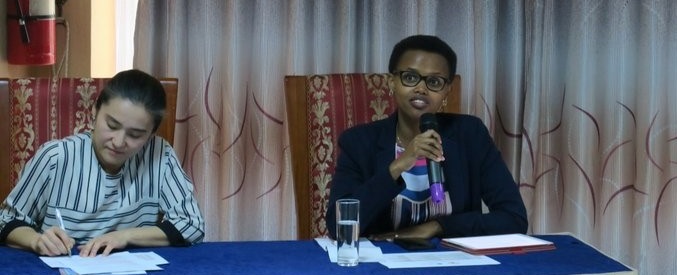Kigali, 18 July 2019: The Permanent Secretary at Ministry of Infrastructure, Mrs. Patricie Uwase officiated the opening of the Thematic Sector Working Group Meeting on Urbanization with a focus on public spaces in Kigali and in six secondary cities
The meeting was organized by the Ministry of Infrastructure (MININFRA) in collaboration with Global Green Growth Institute (GGGI). The Sector Working Groups are set as a mechanism to prepare yearly forward and backward looking Joint Sector Reviews that monitors activities within the sector.
As an introduction to the Urbanization sector, the first Thematic Sector Working Group Meeting on Public Spaces was held in October 2018. Thereafter during the National Urban Forum held in February 2019 with a specific theme on “Implementing the New Urban Agenda” two side events were planned(Urban Walk and Talk) parallel to the National Urban Forum, to promote public spaces .
At the opening of the Thematic Sector Working Group on 18July, both, Permanent Secretary at MININFRA and GGGI’s Country Representative, highlighted the need of involving private sector in the developing public spaces, as surveys, assessments and mappings are done and informed design of public spaces ready for implementation. They encouraged all stakeholders to further advocate for safe, inclusive and accessible public spaces for rapidly urbanizing Rwanda.
UN-Habitat presented on the importance public spaces have for urban development, highlighting Agenda 2030 and the New Urban Agenda that are being localized and implemented in Rwanda to achieve Sustainable Development Goals. She highlighted transportation efficiency, public health, environmental sustainability, enhanced safety, promotion of equity and social inclusion as benefits of public spaces. Notably stating that public spaces can also generate income, attract investment and create wealth.
Rwanda Environment Management Agency presented activities on rehabilitating wetlands in Kigali with a focus of Nyandungu urban wetland being rehabilitated and built as an eco-tourism park, designed by Afrilandscapes while Afrilandscapes Operations and Projects Manager presented the design project of the 130 hectares of wetland and other Key public spaces projects including four main roundabouts namely, Sonatubes Roundabout (KK3), City center Roundabout (KN1) convention center Roundabout (KG2) and Prime minister’s Precinct all in Kigali.
MASS Design Group also described their integration of public spaces by illustrating their work done within affordable housing development project in Masaka and other projects outside Rwanda.
The City of Kigali presented public spaces planned by the draft revised master plan of the City of Kigali and benefits private stakeholders could have by investing in public spaces. Such benefits ranged from increased project density to transferable development rights. Revision of master plans for six secondary cities is ongoing and participatory planning process brought in citizens needs for well-designed public spaces. Surbana International Consultants stated how public spaces for secondary cities are of vital as they shape peoples experience and understanding of city and culture and such spaces become a city’s identity.
Master plans were informed by a study on public spaces done by the School of Architecture and Built Environment of University of Rwanda presented, The School mapped open spaces in secondary cities that could become well designed and utilized public spaces whereas Rwanda Housing Authority presented the completed designs for public spaces in Nyagatare, Huye and Rubavu, an outcome of a yearlong initiative now a waiting for implementation.

 ENGL
ENGL KINY
KINY